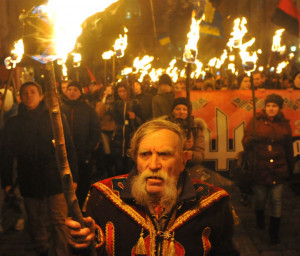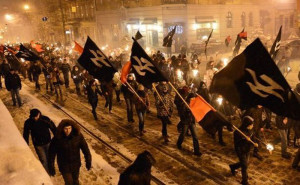
New Reality on Global Stage
In the post George W. Bush period wars no longer meet the three criteria set out above. Too often they serve private interests and not public ones. Already 300 US-paid mercenaries from the former Blackwater/XE/Greystone Limited, a subsidiary of Vehicle Services Company LLC, are in Ukraine providing illegal “non-state” military support to the thousands of mercenaries already in the country. The arms they are using are also supplied by arms dealers who are significant contributors to US domestic political campaigns.
What is happening in Ukraine is not right against wrong, good versus evil, cops versus robbers. It is therefore little wonder that Russia views the overthrow of President Yanukovich’s democratically elected government as having been masterminded by the West and led by the US. But as usual, the West is not talking about the mercenaries and arms dealers and what their agendas are. It is seeking to claim the moral high ground in its actions, justifying everything by grand principle rather than any of the many other things which also lie behind any action, taken by anyone, in any area of life.
This battle for moral advantage, and the claims that every action the West takes in Ukraine is justified, and any opponents’ actions are illegal, will only hinder resolution of the conflict, as bombs and bullets kill no matter who uses them and why. Therefore it is important to examine the assumptions which lie behind the Western position, which are at present being unequivocally swallowed, in order to see what is really going on our TV screens every day.
The Situation on the Ground
It is now being widely reported that radical Jew-bashing is taking place in Ukraine and ultra-nationalist anti-Semitic groups have seized control of the government. Nearly 100 people have been killed in Kiev, and among more recent attacks a 22-year-old man was stabbed to death in clashes in Donetsk between pro-Russian protesters and a crowd favoring European integration and denouncing Russian forces’ in supporting Crimea.
While such problems are not unknown in civil conflict situations, they are being justified in the West as an acceptable price to pay for removing the elected government and replacing it with one more in line with Western thinking. After all, Ukrainians are too obtuse to have democratic rights, in the eyes of the West. After supporting the Orange Revolution, ostensibly a popular uprising against Yanukovych, they resoundingly rejected the government installed then and turned to Yanukovych at the polls. If a few hundred have to die now to correct the people’s stupidity, so be it, the West is in fact arguing.
But it is being strung up by its own argument. Anatol Lieven, expert on the Chechen War and author of ‘Ukraine and Russia: A Fraternal Rivalry’, explains:
“Western governments, too, have put themselves in an extremely dangerous position. They have acquiesced to the overthrow of an elected government by ultra-nationalist militias, which have also chased away a large part of the elected parliament. The West has stood by in silence while the rump parliament in Kiev has voted to abolish the official status of Russian and other minority languages and members of the new government threatened publicly to ban the main parties which supported Yanukovych – who was democratically elected – an effort which would effectively disenfranchise around a third of the population.”
In the light of all this, we may well ask if what the principles the Ukraine conflict is supposed to be about – self-determination, democracy, human rights – are actually anything to do with it. The answer, however, is more sinister than anything implied by the question.
Right to Protect Doctrine

For example, a fuss is being made of Russia’s Right to Protect doctrine. The implication of the Western commentary is that this is a uniquely Russian phenomenon. However, all countries have the same doctrine in one form or another, and recognize a duty to protect their own nationals, wherever they may be. This is one of the reasons countries have embassies and consulates, and a Russian Embassy in Ukraine would hardly be able to help its citizens in the present situation without military support, even if it were allowed to do so.
The military intervention aspect to Russia’s Right to Protect Doctrine is criticized as being threatening or unnecessary. If misapplied, it is, but so is any other such doctrine; most countries have some equivalent principle embedded in theirs. For example, France has recently invaded Mali because 400 of its citizens are under a perceived threat, whilst saying that Russia cannot protect millions of its citizens on the same basis.
Angela Merkel told the Bundestag (German parliament):
“In Kosovo we had years in which the international community had no power to intervene while Slobodan Milosevic carried out his ethnic cleansing. NATO then decided to act alone because Russia continuously blocked any UN mandate on Serbia. That situation is in no way similar to what is happening today in Ukraine,” she said, adding:
“… it is shameful to compare Crimea to Kosovo. And even if there had been other breaches of international law – Kosovo not being one of them – Russia’s actions in Ukraine are still a breach of international law.”
All this ignores one main factor, among many others: the legal government of Ukraine asked Russia, in writing, to send its troops in. It had the legal power to do so and Russia had the legal power to accept. We may agree with this action, we may not. But no one ever asked the EU to intervene in Kosovo, and nor did the EU give the Serbs and others living there any right to self-determination – quite apart from the issue of the EU arming the demilitarized zones, which is a rather more obvious breach of international law.
What goes around comes around
President Vladimir Putin has kept careful notes on the track record of the US, and its use of “power over principle” in foreign policy. The US has long paraded around the world as a self-appointment policeman, invading countries and toppling legal governments under flimsy excuses, on the basis that its values must ipso facto be better than those of anyone who disagrees with it. Yet others are not allowed the same right, as only America has positive values, in its own eyes.
The US’ sordid interventions, even those conducted with its NATO partners under the guise of international law, are better described as wars of aggression – and invariably are, sooner or later, by the people who live in the countries the US maintains it is liberating, who take the US at its word and then see what it actually does.
In Iraq, Afghanistan, even Mussolini’s Italy, the people who begged for US-led change soon turned against the forces which brought it. Compare this to the reverence with which Imperial Russia is still held in the Slavic states of the Balkans, for whose liberation and independence they fought, which even Soviet repression, which has no support now, has not been forgotten.
Even before the referendum Russia already has a military presence in Crimea under treaties freely signed, long ago, by both Russia and Ukraine. It has every right, under the terms of these treaties, to beef up its military presence there, and also a moral obligation to prevent the new government in Kiev taking revenge on the citizens of that ethnic enclave and strategic naval base.
But therein lies the problem for the West. If you think your values are better than anyone else’s, only you can have a moral obligation, and only the actions you like can have a moral basis. If others are also moral you have to accept that you should not allow your less-than-moral actions, which you justify by the moral ones, to occur, because morality is not your exclusive preserve.
Choosing Your Friends
The idea that only the West is moral is taking some extreme forms- Chancellor Angelia Merkel has advocated unconditional support for the new Ukrainian regime, thinking that as neither side likes Yanukovych both are morally right. However Gregor Gysi, who is admittedly head of The Left, the successor to the East German Communist Party, has highlighted that the Chancellor of Germany, of all people, should know better than to be seen supporting rulers who have made the statements the new ones in Ukraine acknowledge having made.
“With fascists in power in Ukraine, Germany and the West are standing by and doing nothing. The Svoboda party has tight contacts with the NPD and other Nazi parties in Europe. The leader of this party, Oleg Tyagnibok, has said exactly this,” Gysi told the Bundestag, reading a direct quote from Tyahnybok:
“Grab the guns, fight the Russian pigs, the Germans, the Jewish pigs and others.”
The whole basis of the post-World War II German state is threatened if it supports rulers who make statements no different to those of Adolf Hitler, even if they welcome the overthrow of Yanukovych. This action is no different to anyone saying that the collapse of the USSR was a tragedy. One action is widely condemned, the other not.
But of course Germany can keep Tyahnybok’s words up its sleeve for its own purposes. They constitute a threat to German citizens, and will be kept out of public discourse until he offends the West, which will then grant itself the right to do exactly what Russia has done.
What is Really Happening
The EU wants the Ukraine because it is big, but it has lost it by demanding that Ukraine should never deal with Russia, despite the fact every EU country does. The United States and NATO want Ukraine because it is next door to the Russian Federation, which is still perceived as a geopolitical and geo economic threat. The RF wants Ukraine independent because it doesn’t want other people’s rockets next door to it.
But what all sides are doing is trying to retain control of their own influence. They don’t want to admit that whoever sells the guns and controls the economy will win, right or wrong. That’s why they never admit to talking to lobbyists, those thousands of people who earn good livings doing nothing but talk to politicians privately and subvert the democratic process. All the sides from the so-called democratic West are fighting for themselves, not Ukraine, not any moral principle.
Seth Ferris, investigative journalist and political scientist, expert on Middle Eastern affairs, exclusively for the online magazine “New Eastern Outlook”.
